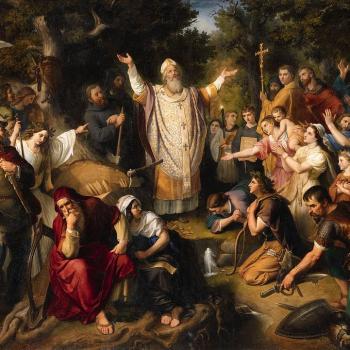After further catastrophes deprive Job of his health, leaving him only with a smelly robe and a broken piece of pottery with which he may scrape his foul sores, his wife urges him to get it over with and "curse God and die" (2:9). Even though the Hebrew text actually reads "bless God and die" (perhaps a pious copyist could not bear to place the words "curse" and "God" in such close proximity), it seems clear that Mrs. Job's intent is for her husband to stop the monstrousness of his life, a life she can no longer bear to witness. His wife is thereby not a bad person; she merely can no longer stand to watch the man she loves suffer so cruelly.
But he disagrees with her and calls her a "foolish woman." And rather than answer her demand for him to curse God with a powerful statement as he did at the end of the first chapter, he now asks a question, and it is that question that will lead us into the heart of the poem. "Shall we receive the good from God and not receive the evil?" This is also the question of the remainder of the book.
If God is author of all, good and evil, just what sort of God is that? Job's so-called friends believe that God is author of all, and as such, is punishing Job for some foul thing he has done. Good people, they say, do not end up on ash heaps with foul diseases. But we the readers know what they do not; Job is not on the heap due to some supposed evil deed. To the contrary, he is the most righteous man we know. This fact also makes it quite clear that the three friends of Job, the minute they clap their eyes on him, are convinced beyond doubt that he is nothing but evil. Their so-called "empathetic silence" in 2:11-13 is rather their silent hope that the sinner will soon die, as all sinners in their reward and punishment world must do, and quickly.
Much to their increasing chagrin, Job does not die, but starts to talk and talk and talk. He will have none of their simplistic views of God and the universe, and his marvelous tale will lead us all to the questions every religious person needs to be asking all the time. Perhaps the main question is this: if God does not reward the righteous and punish the wicked, then just what is God doing anyway? The rest of the story will get at that question in some fascinating and unforgettable ways. But that remains for another sermon. Stay tuned!





